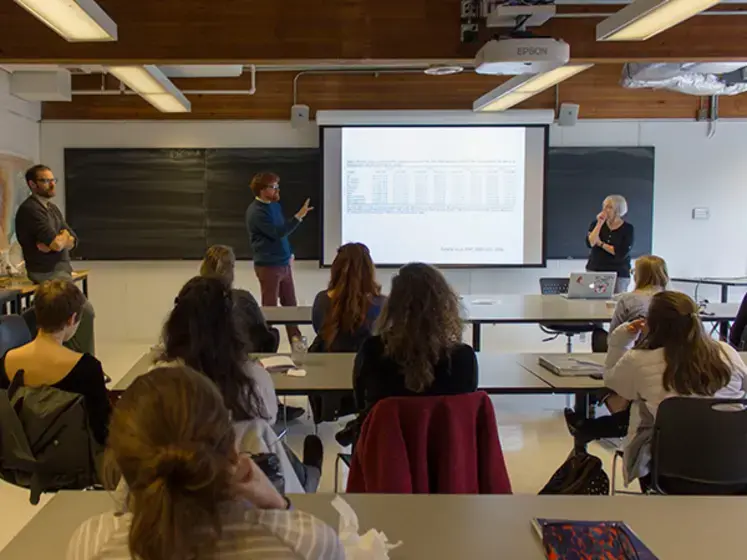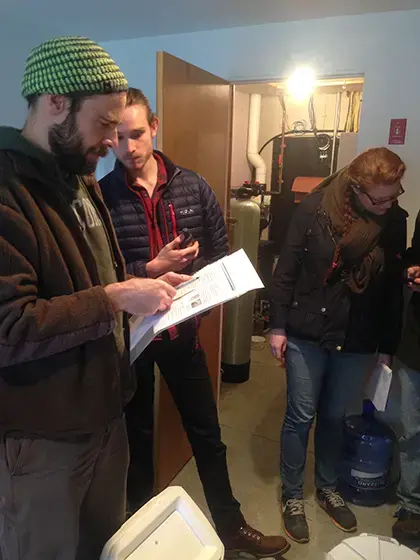NSF Awards Bennington Rapid Response Grant to Study PFOA
The National Science Foundation (NSF) has awarded Bennington College nearly $90,000 for a Rapid Response grant to support a new course and conduct original research on the perfluorooctanoic acid (PFOA) contamination recently discovered in Hoosick Falls, NY, and North Bennington, VT.



North Bennington, VT—The National Science Foundation (NSF) has awarded Bennington College nearly $90,000 for a Rapid Response grant to support a new course and conduct original research on the perfluorooctanoic acid (PFOA) contamination recently discovered in Hoosick Falls, NY, and North Bennington, VT.
Support from the NSF will allow Bennington College to do what it does best: engage the big problems of our present directly and put students and faculty to work crafting new insights and new solutions in real-time.
“Support from the NSF will allow Bennington College to do what it does best: engage the big problems of our present directly and put students and faculty to work crafting new insights and new solutions in real-time,” said David Bond, the Associate Director of the Center for the Advancement of Public Action (CAPA) at Bennington College and Principal Investigator of the grant.
Bond is joined on the grant by chemistry faculty Janet Foley and geology faculty Tim Schroeder.
“This is a relatively new pollutant and there is a lot of confusing information out there,” Foley said. “This project enables us not only to teach at the frontier of what is known about PFOA but also to conduct original research with students that will produce better information for our community. Whether in testing the mobility of PFOA from contaminated soil into garden vegetables or maple syrup or in measuring the movement of PFOA in our aquifers, we hope to involve students in research questions that really matter to our community.”
PFOA was discovered in alarming levels in the municipal water system of Hoosick Falls, NY last year and more recently in a number of residential wells in North Bennington, VT. The public water supply of North Bennington, which supplies Bennington College, has tested free of PFOA. Bond and his colleagues proposed a course investigate the situation in January.
A key part of the course we are offering and the research we will conduct centers on equipping students with the scientific literacy now required to be effective citizens when a disaster like this strikes.
“A key part of the course we are offering and the research we will conduct centers on equipping students with the scientific literacy now required to be effective citizens when a disaster like this strikes,” Schroeder said.
Understanding PFOA
Once a key ingredient in high-performance plastics like Teflon, PFOA has come under increased scrutiny as low-level exposure has been correlated to a number of adverse health effects, including developmental problems, reproductive harm, and some cancers. Although PFOA was phased-out of manufacturing in the U.S. last year, a tremendous amount remains in the environment. PFOA was also used in teflon tape for plumbing, in microwave popcorn bags, in flame retardant clothing, stain-resistant materials, and fire-fighting foam.
PFOA is water-soluble, resists natural degradation, is chemically stable in water for nearly a century, and is readily absorbed by the body when consumed. As the EPA summarizes, “the toxicity, mobility, and bioaccumulation” of PFOA poses difficult questions for safeguarding human health in areas where it has been released into the environment.
“Understanding the unique physical properties of PFOA is key to understanding the risks it poses,” Foley said. “We will be working to understand how the PFOA molecule interacts with the environment, especially our water and our soils. In conversation with the ongoing work of state agencies in Vermont and New York, we hope to develop a more comprehensive picture of how the chemistry of PFOA influences its mobility in our environment.”
“PFOA is a frustratingly subtle and long-lived environmental contaminant that is only beginning to come into focus in science and policy,” Bond said. “Unfortunately, it seems we are at the very tip of the iceberg with PFOA. But that is also an opportunity for Bennington College to lead the way in training students and residents to navigate the discovery of PFOA in their drinking water, in empowering communities to ask better questions of state and local leaders when such a disaster strikes, and to begin building better protections for our water resources.”
About the grant
NSF Rapid Response grants are “used for proposals having a severe urgency… including quick-response research on natural or anthropogenic disasters and similar unanticipated events,” according to the federal agency. In the past few years, NSF Rapid Response grants have enabled universities and colleges to respond quickly to disasters and to produce much-needed data on the disaster. NSF Rapid Response grants played a key role in producing vital independent assessments during the BP Oil Spill, the West Virginia Elk River chemical spill, and the lead tainted water of Flint, Michigan.
About the course
The grant will support a new course, “Understanding PFOA in Our Water”, at Bennington College that will be offered this term and again in the fall. Covering environmental organic chemistry, contaminant hydrogeology, and environmental policy, the course will be co-taught by Bond, Foley, and Schroeder. The term’s course will begin the first week in April and will run for six weeks. Enrolling 20 students as well as local leaders and public school teachers, this course will review existing scholarship on PFOA in order to design and implement original research on PFOA contamination in Hoosick Falls and North Bennington.
As part of the course, faculty and student research teams will conduct independent analysis of the origins, pathways, and full extent of PFOA contamination. With new equipment to sample and analyze groundwater and with support to send over 200 water samples to an EPA certified laboratory that can measure PFOA in parts per trillion, this research will provide a broad preliminary characterization of PFOA groundwater contamination in our region. It will also contribute to a new database on PFOA in the region that is being developed by Schroeder.
“As more and more attention has turned to PFOA in the last three months, we’ve begun to realize how extensive the problem of groundwater contamination might be,” Schroeder said. “Part of our project will consist of building a database for our region that can identify hot spots and locate points for long-term monitoring as well as future research projects for students and other scientists.”
The faculty members will present preliminary findings to the community late this spring.
About Bennington College
Bennington College is a liberal arts college in southwestern Vermont that distinguished itself early as a vanguard institution within American higher education. It was the first to include the visual and performing arts in a liberal arts education, and to integrate work in the classroom with work in the field. To this day, Bennington stands apart in requiring that every student—every winter term—get a job, complete an internship, or pursue an entrepreneurial experience. Bennington students work intensively with faculty to forge individual educational paths around their driving questions and interests. The College graduates small classes of tested students, regardless of chosen field, who are notably confident in their capacity to engage and succeed in the world. For additional information, bennington.edu.
About the Center for the Advancement of Public Action
Founded in 2011, the Center for the Advancement of Public Action (CAPA) at Bennington College is furthering the educational philosophy and pedagogy of the College by connecting classroom learning to hands-on engagements with a wide range of current issues like international conflict and leadership, art in the public realm, incarceration in America, and, increasingly, our region’s food, energy, and water systems. CAPA teaches the essential capacities needed to develop an educated and emboldened citizenry. Drawing together the deep artistic and analytic resources of Bennington College and collaborating with existing public and private organizations, CAPA leverages the classroom as a new kind of laboratory for creative problem solving and innovation.